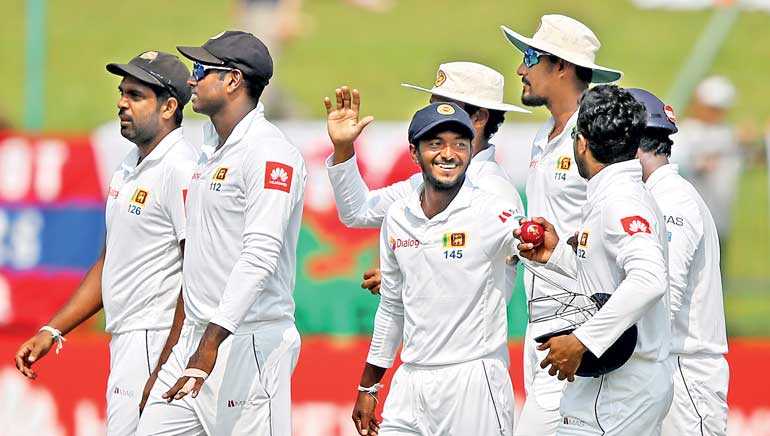Monday Feb 23, 2026
Monday Feb 23, 2026
Tuesday, 20 November 2018 01:38 - - {{hitsCtrl.values.hits}}

ESPNCricinfo: Yet another Sri Lanka loss, influenced by yet another round of missed chances and poor fielding, has led to yet another coach putting forth yet another plan to correct this long-standing woe.
Sri Lanka’s fielding, and their catching in particular, has been awful since 2015, with a substantial proportion of losses since then having been put down to dropped catches and bad ground fielding. Against England at Pallekele, there was a vast chasm in the fielding standards between the sides. Where Sri Lanka missed a vital stumping, dropped straightforward chances, and were generally shoddy in the outfield, England were alert, athletic and well-drilled.
Successive Sri Lanka coaches – Marvan Atapattu, Graeme Ford and Nic Pothas included – have attempted to resolve the fielding problem, putting their teams through intensive fielding sessions, and making the discipline a priority at training. Despite this, Sri Lanka have continued to be one of the worst fielding sides in the world.
Now, present coach Chandika Hathurusingha believes a change in selection criteria could be part of the solution. Hathurusingha himself is part of the on-tour selection committee, but is understood to work very closely with the official selectors, and carries considerable clout at selection meetings.
“I completely agree that fielding has been an issue for us for a long time in every format,” Hathurusingha said after the series defeat to England. “I think it’s a big-picture thing. The guys who are not fielding well up to the mark, are the same kinds of players who are coming through the system. They are not athletic enough or skilled enough to do that kind of fielding. We need to address that.”
One of the “kinds of players” Hathurusingha may be referring to is left-arm spinner Malinda Pushpakumara, who dropped a straightforward catch at long on during the first innings, and was generally sloppy around the field. Pushpakumara is in the team due to his incredible domestic record - he has 672 first-class wickets at an average of less than 20. If the selectors bring in a policy of ruling out players based on their fielding standards, however, Pushpakumara may find himself needing to improve his fielding rapidly to stay in contention.
“We need to look at fielding as a No. 1 thing,” Hathurusingha said. “Most of the time we look at their No. 1 skill – either bowling or batting – and then you ignore the fielding sometimes. But we need to look at that very seriously when we select. We need to look at their ability to contribute in the field. The important thing in fielding is attitude.”
England, meanwhile, have been consistently outstanding in the field, taking match-defining catches, and making outstanding diving stops. They are coached by Trevor Bayliss, the man who was in charge of Sri Lanka from 2007 to 2011 – an era in which Sri Lanka’s fielding standards were much higher. Mahela Jayawardene, who played under Bayliss throughout that period, said fielding had been a major priority in the team.
“When Bayliss came to SL the biggest thing for him was fielding,” Jayawardene said on Sky Sports, for whom he is appearing as an expert during this tour. “He will get very critical of guys on the field - body language, and the attitude. He might not get so critical of batsman and bowlers missing out – he understands that. But if someone is heading in the wrong direction, he’ll be pulled out and they’ll have a chat. He won’t compromise on fielding. He wants that attitude and energy, and anyone who’s slacking, he will get red-faced.
Jayawardene has especial insight into Bayliss’ methods, having been the captain for two of the Bayliss years. “He wanted our fielding standards to be right up there, so he kept pushing us. We’ve seen that in England now. He’s never going to shy away from making the big calls. When he was in Sri Lanka he left out a lot of senior players. It wasn’t easy, but he backed all the decisions. He backed the selectors and said: ‘I want these things done.’”